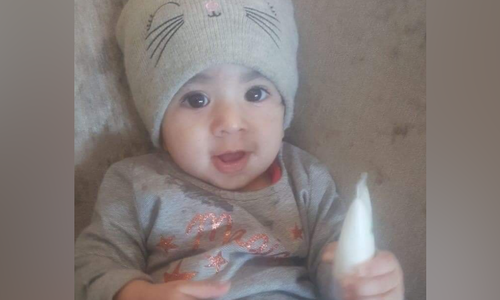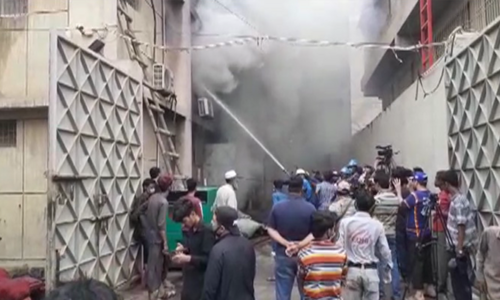KARACHI: The ongoing judicial activism and reforms have yet to build people’s confidence in the system as several high-profile cases, which sent ripples across the country and won much media fanfare, ended with compromises that too interestingly from the weaker section of the society where complainants withdrew their pleas or agreed for out-of-court settlements.
The complainants in many cases backed out from their claims and agreed to a compromise with alleged offenders.
The cases included the death of a nine-month-old girl, Nashwa, because of alleged “negligence” at one of the famous private hospitals; the death of six members of a family in a Qasr-i-Naz room and the killing of two young siblings who died from food poisoning after consuming meals from a city’s famous eatery.
Then there was another high-profile case of six labourers who had fallen to death while working at a multi-storey under-construction building in Clifton. All of these incidents had taken place during 2019 and were decided by the courts after the suspects, who were mostly wealthy and mighty, had paid diyat (blood money) to the families of the victims who in turn had withdrawn their cases.
It did not end here as the ongoing case of the death of 16 workers in a fire incident in a Korangi factory in August this year, is most likely to meet the same fate.
Recently, factory owner Hassan Ali Meetha and building owner Faisal Tariq along with four of their detained employees were released on bail by District and Sessions Judge (East) Khalid Hussain Shahani after they paid Rs4.2 million diyat to the family of each victim.
However, an analysis of the cases suggested that the incidents involving financially well-off families had compromised murder cases on humanitarian grounds and did not accept blood money from the accused persons.
Twins’ death from food poisoning
In November 2018, two brothers — five-year-old Muhammad and one-and-half-year-old Ahmed — died after consuming food from an upscale restaurant, Arizona Grill, in Zamzama, Defence.
The incident that created much debate on the quality standards at eateries ended in January 2019 with the suspects acquitted by a court as the victims’ parents pardoned them.
Refusing the blood money, the parents had filed affidavits with the trial court stating that they had pardoned the restaurant’s owner and staffers in the name of the Almighty Allah without any fear or pressure.
Deaths in guesthouse
In March 2019, in yet another unfortunate incident, five siblings and their aunt died after consuming toxic gas during their overnight stay at a guesthouse in the metropolis.
A couple along with their five children — aged between 1.5 years to 10 — arrived from Pishin and stayed at Qasr-i-Naz and found death on Feb 22. It turned out to be an act of negligence on the part of the state-run facility’s management as well as health authorities when medical and chemical analysis reports revealed that the cause of their death was consuming poisonous gas — illegally sold in the market openly — used by the guesthouse’s staffers to kill mosquitoes, etc.
Once again, the victims’ legal heirs forgave the suspects in the name of the Almighty Allah, without any fear or pressure or compensation.
“No blood money was accepted by the victims’ family, but they withdraw the case and pardoned the accused persons on humanitarian grounds,” Inspector Atique, the investigating officer of the case, had told Dawn at the time.
Pardon for a cause
In some cases, bereaved families pardoned the accused putting up certain terms and conditions “for a cause”.
For example, in the case of Nashwa, her parents had pardoned the accused in the name of the Allah without any fear or pressure, subject to certain terms and conditions, including establishing a Nashwa Fund to help educate poor and needy medical students by the management of the Darul Sehat Hospital.
The case pertaining to the death of 10-year-old Amal Umer during a shoot-out in August 2018 had led to the passage of a law — the Sindh Injured Persons’ Compulsory Medical Treatment (Amal Umer) Bill — to ensure instant medical aid to every injured person before ‘medico-legal formalities’ are performed at health facilities.
Amal’s family had campaigned aggressively to ensure that every injured person is provided immediate medical aid before indulging into the complicated medico-legal procedures at hospitals.
In most of the cases, bereaved families are not financially strong enough because of losing their breadwinners in incidents or accidents, thus they opt to pardon the accused persons against blood money.
In the case pertaining to the death of six labourers, families had signed a compromise with the builder and others against the payment of blood money.
What’s compromise
“In almost all such cases, police lodge FIRs under Section 322 (qatl-bis-sabab or manslaughter) of the Pakistan Penal Code (PPC),” senior lawyer Shaukat Hayat told Dawn. “The section provides for parties to compromise a case involving death(s) of anyone, if during the investigation, it is proved that such an act was ‘unintentional’.”
Subsequently, judicial record suggested that the legal heirs of the victims in those cases had compromised the matter with the nominated accused persons in terms of Section 435 of the criminal procedure code (CrPC). The accused were initially released from the custody and then acquitted of the charges.
In most of the cases, victim(s) legal heir file a personal affidavit signed by them stating they have pardoned the accused in the name of the Almighty without any fear or pressure. However, behind the scene the accused settle the matter out of court by paying blood money to the family of the victim(s).
Mistrust in system
In most of the cases, poor families opined that even if they had pursued the legal battle, they would have hardly won it because of the legal complications in police investigation and lengthy procedures.
“I think, nothing will be achieved if they [accused persons] remain jailed, then who will help us,” 40-year-old Afzal Ahmed, who lost his three younger brothers in the Mehran Town factory fire, told Dawn.
“If they [accused] are out, they might at least do something for us,” he added, hoping that the Rs4.2m blood money agreed by the factory owners would be paid to help his family.
The blood money might help living family members of victims, but experts say it leads to further deterioration of the already messed-up governance system in the country.
“It is not just the suspects responsible alone, government functionaries too are equally answerable and liable to be punished since their inaction leads to the alleged violations of the law,” said Advocate Hasan Sabir, who is representing the owners of the Mehran Town factory. “The judicial magistrate has rightly held the relevant authorities responsible for the tragic death of 16 workers and asked police to also include them in the investigation,” he added.
Published in Dawn, December 6th, 2021






























